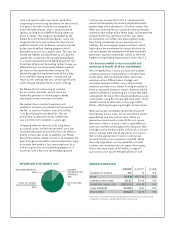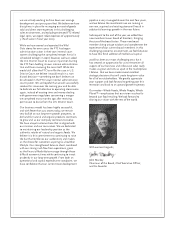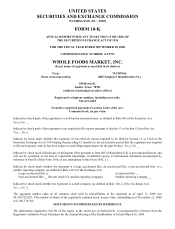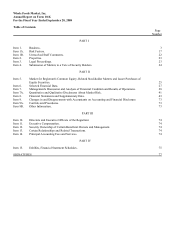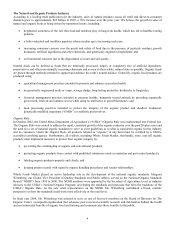Whole Foods 2008 Annual Report Download - page 15
Download and view the complete annual report
Please find page 15 of the 2008 Whole Foods annual report below. You can navigate through the pages in the report by either clicking on the pages listed below, or by using the keyword search tool below to find specific information within the annual report.We also strictly monitor how animals are raised and what they are fed. Our requirements for the meat and poultry we sell in
our stores ensure the animals are:
• raised without antibiotics;
• raised without added growth hormones in any species, far beyond the federal regulations that prohibit added growth
hormones in poultry, pigs, veal or bison;
• never fed animal byproducts;
• raised by farmers and ranchers who care about the animals and the environment in which they live; and
• monitored, from the farm to our stores, to track compliance with our stringent animal welfare and food safety
requirements.
Animal Welfare Standards
In fiscal year 2008, the U.S. office of the World Society for the Protection of Animals ranked Whole Foods Market first in its
survey ranking 23 retail grocery corporations in the United States by the availability of humanely labeled food on their
shelves, finding that Whole Foods Market offers twice as many humanely labeled products per store as the second rated
company.
Whole Foods Market is strongly committed to helping create alternatives to the “factory farm” methods of raising livestock.
We have encouraged innovative animal production practices to improve the quality and safety of the meat and poultry sold in
our stores, while also supporting humane living conditions for the animals. For this reason, we refuse to sell commercial veal
from tethered calves, foie gras from force-fed ducks, and eggs from caged hens.
In December 2003, we started working through a consultative multi-stakeholder process to develop “Animal Compassionate”
standards, farm animal treatment standards that go above and beyond our baseline requirements for the meat and poultry sold
in our stores, focused on providing environments and conditions for each species that support the animal’s natural physical,
emotional and behavioral well-being. In 2006, that work was then used as a basis for creating meat and poultry production
standards categorized according to a framework for continuous improvement of animal welfare on farms and ranches and to
provide our customers with a clear and transparent way to make informed buying decisions based solely on animal welfare
considerations. In June 2007, we piloted a five-tiered meat and poultry labeling program at our Kensington store in London
based on this framework. Further standards development and implementation of the 5-Step Animal Welfare Rating system
was transitioned to the Global Animal Partnership foundation when it was founded in the spring of 2008. Whole Foods
Market will conduct a two-year pilot for the Global Animal Partnership to test the implementation of the 5-Step Animal
Welfare Rating system beginning in early 2009, before the foundation extends the program to other retailers.
Product Selection
Our product selection includes, but is not limited to: produce, seafood, grocery, meat and poultry, bakery, prepared foods and
catering, specialty (beer, wine and cheese), coffee and tea, nutritional supplements, vitamins, body care and educational
products such as books, floral, pet products and household products.
We believe our heavy emphasis on perishable products differentiates us from other supermarkets and helps us attract a
broader customer base. We believe that all shoppers, not just natural and organic food shoppers, appreciate great produce,
dairy, meat, seafood, bakery and prepared foods. We believe it is our strength of execution in perishables that has attracted
many of our most loyal customers.
Locally Grown
Our history and reputation are intimately linked to our support of local farmers. For more than 28 years, we have provided
our customers with the broadest possible selection of the highest quality produce available. Our search for produce begins
right outside our front door in every community where we do business. We are committed to buying from local producers
whose products meet our high quality standards, particularly those who are dedicated to environmentally friendly,
sustainable agriculture. We are greatly increasing our efforts in this regard by further empowering our individual store and
regional buyers to seek out locally grown products. We value this natural diversity and have firm guidelines for using the
term “local” in our stores. For example, only produce that has traveled less than seven hours from the farm to our facility can
be labeled “locally grown.”
9


